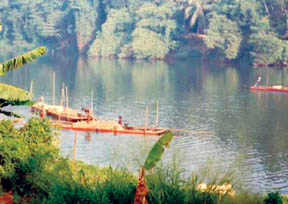
Improved access to safe water
Over 1.2 billion people have gained access to safe water since 1990.
Between 1990 and 2004, global coverage of safe drinking water has risen
from 78 to 83 per cent, according to 'Progress for Children: A Report
Card on Water and Sanitation', which was launched recently by UNICEF.
The report charts the progress made towards Millennium Development
Goal 7, which includes the target of halving the proportion of people
without sustainable access to safe drinking water and basic sanitation
by 2015.
Latin America and the Caribbean and the South Asia regions will meet
the drinking water target almost 10 years early.
"The progress made to date in increasing the number of people with
access to safe water has been impressive," UNICEF, Executive Director,
Ann M. Veneman said. "However, unsafe water and lack of basic sanitation
contribute to the deaths of an estimated 1.5 million children under five
each year as a result of diarrhoea."
The report has also found that an estimated 1.2 billion people have
gained access to basic sanitation since 1990, with global coverage
rising from 49 to 59 per cent. In South Asia, access to improved
sanitation more than doubled between 1990 and 2004.
In East Asia and the Pacific, the proportion of people with basic
sanitation rose from 30 to over 50 per cent. "Despite commendable
progress, an estimated 425 million children under the age of 18 still do
not have access to an improved water supply, and over 980 million do not
have access to adequate sanitation," Veneman said.
"Clean water and sanitation are vital prerequisites(something
required as a prior condition) for improved nutrition, reductions in
child and maternal mortality and the fight against disease."
Water and sanitation-related illnesses can affect children's school
attendance and academic performance. Girls, in particular, may be
deterred (hindered) from schooling by the need to fetch and carry water
for their families.
Improved sanitation facilities could reduce diarrhoea-related
diseases in young children by more than one-third, the report said. With
better hygiene practices, such diseases could be reduced by two thirds.
While the world is on track to meet the water target, progress could be
impaired if the provision of safe water to the world's poorest
communities is not made a priority.
Sanitation is a much greater challenge. Despite significant gains,
the world is not on track to meet the MDG target for sanitation. In
South Asia, for example, two out of three people still lack basic
sanitation.
The report said that the benefits of improved drinking water and
sanitation are evident and could be extended to many more of the world's
people, if only sufficient resources and resolve were dedicated to the
task.
Stamp to mark Children's Day
A five rupee stamp and a first day cover to mark 'World Children's
Day' was issued at Temple Trees on October 1 under the auspices of
President Mahinda Rajapaksa.
A flag designed for 'World Children's Day' was also pinned on the
President by two children of the Child Training and Counselling Service
Centre. The proceeds of the sale of these flags will be credited to a
Child Development Fund, which will aid the basic needs including
education, of poor and less privileged children.
The government has focused its attention and formulated many
programmes with the idea of developing and improving the living
standards and welfare of local children. Some of these programmes are
already being carried out by ministries, government departments and
other government and non-governmental organisations.
The year 2006 has also been declared as the National Year of Children
to emphasise this fact.
October 17: Day to focus on poverty
The world commemorates two important days this week; while the World
Food Day is observed tomorrow (October 16), the next day, October 17 is
the International Day for the Eradication of Poverty. Both concepts are
inter-related.
The Day seeks to increase awareness of the need to eradicate poverty
in all countries, especially in developing countries, and is a day to
remind people that sustained and joint efforts are needed to achieve the
Millennium Development Goal of halving the number living in poverty by
the year 2015.
This year also sees the end of the First UN Decade for the
Eradication of Poverty, which was effective from 1997.
This Decade further stressed the need to eradicate poverty. The UN
General Assembly proclaimed the Decade in 1995 to follow up on the
International Year for the Eradication of Poverty, 1996. The Decade's
main objective is eradicating absolute poverty and reducing overall
poverty substantially in the world.
The theme for the Decade is 'Eradicating poverty is an ethical,
social, political and economic imperative of humankind'.
The International Day for the Eradication of Poverty was declared by
the UN General Assembly in 1992.
Special nutrition programme for children
A special nutrition programme which will benefit the children of
Samurdhi and other underprivileged families has been implemented by the
government, through the Samurdhi Movement.

Accordingly, all children between the age groups of two and five, of
such families will receive a glass of fresh milk daily.
The national nutrition programme was launched recently at Elapatha
Divisional Secretariat, Ratnapura. The pilot project in this regard was
initiated by the Department of Commissioner General of Samurdhi, in
Siyabalanduwa, Madulla (Moneragala district), Rideemaliyedde,
Meegahakiula (Badulla district), Suriyawewa, Katuwana (Hambantota
district), Kalpitiya, Mundalama (Puttalam district), Ambagamuwa (Nuwara
Eliya district) and Elapatha (Ratnapura district), the 10 poorest
Divisional Secretariat divisions, according to the poverty index. The
provision of fresh milk to the children in these districts also started
under the first stage.
The programme will benefit around 25,000 children of low income
families in these Divisional Secretariat divisions. The Government is
expected to spend Rs. 32 million on this project.
The Samurdhi Ministry will carry out this project in collaboration
with the Health and Livestock Development Ministries. The required fresh
milk will be produced by MILCO. The distribution of fresh milk will also
be carried out by MILCO and Co-operative Societies in these areas.
Alternatives to river sand mining
Sand mining in rivers is a serious environmental problem, as you may
have heard. Some of the rivers which have been critically affected by
this problem are the Kelani, Gin Ganga and Deduru Oya.

Sri Lanka depends very heavily on river sand for construction
purposes, although the projected sand demand for the construction
industry is always less than the actual usage. However, the mining of
sand in rivers affects the coastal belt, water supply, fisheries,
tourism and agriculture, it was stated at a recent workshop organised by
the Sri Lankan Association for the Advancement of Science on 'sea sand
as an alternative to river sand for construction'.
Off shore sand, dune sand, quarry dust and land-based sand are some
of the sand varieties being used in other countries, instead of river
sand. Off shore sand is used for construction in many countries.
Experiments have proved that it provides durability in construction
projects, workshop personnel said. Some of the solutions offered to the
problem of uncontrolled sand mining in rivers are, restricting or
banning river sand mining, using alternative types of sand, reducing
wastage and improving workmanship. If such actions are adopted, the
damage to the environment could be minimised.
If people in the construction sector were more aware of these issues,
natural disasters, not only in Sri Lanka, but also in other parts of the
world, could be reduced, it was stated at this workshop. |


